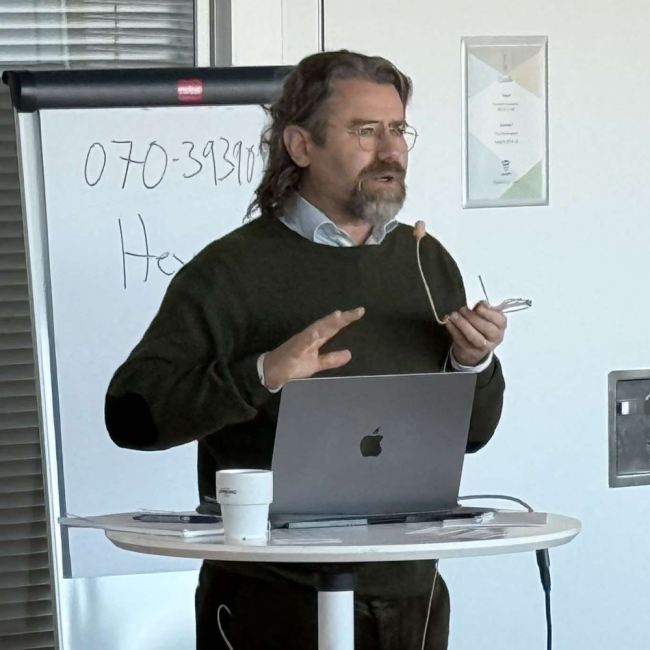Focus on AI at Karlstad Business School’s 13th AoL Day – Longer prompts are better prompts.
2025-02-05Within the framework of the ongoing work on Karlstad Business Schools AACSB accreditation, colleagues gathered to share and learn from experiences from effective teaching, student learning and meaningful examinations. Marie-Therese Christiansson, Head of Karlstad Business School, welcomed the participants with some examples of frameworks used to ensure student learning (Assurance of Learning) in various programs where students are expected to understand, use or develop AI.
As part of the ongoing work with Karlstad Business School’s AACSB accreditation, the staff was presented with an overview of how AI is impacting teaching in various ways. Marie-Therese Christiansson, head of Karlstad Business School, shared that there are many AI-related tips and exercises on the AACSB website.
AI in teaching
Niklas Jakobsson, professor of economics at Karlstad Business School, opened the day by turning up as an avatar. After a brief introduction, the real Niklas took over and explained how you can create your own avatar and use it in teaching.
– I think it can be a good idea to include shorter presentations like this in our teaching and it is fairly easy to get started. You create an avatar in a programme like HeyGen and then let ChatGPT write the script you want the avatar to use. It is a bit tricky but it works pretty well. Lectures can then be translated into different languages if needed.
AI for reflection
Students at Karlstad Business School have varying levels of knowledge of AI. John Johansson, lecturer in business administration, conducts seminars to ensure that students are at a reasonably even level.
– In the seminar format, students learn the basics of AI and then reflect on its use. For example, AI is used to give students feedback on their work. In another format, we work with case studies where students read reports and then get to choose whether AI should be part of the feedback. These efforts help the students and will hopefully make them less likely to use AI to cheat.
Integration between law and information systems
Cyril Holm, docent in jurisprudence at Karlstad Business School, has together with John Sören Pettersson, professor of information systems, used AI in examinations.
– Law and information systems are interconnected. What is referred to as legal prompt engineering is terribly effective. If AI was a preschool pupil five years ago, it is now on the verge of earning a doctorate. That insight is something we need to consider in our teaching and our examinations. In the course where students from the law and information systems programmes were integrated, they were allowed to use as much AI as they wanted, as long as they reported how they had co-created the texts using AI. It was absolutely fascinating to follow the students, and the result of this form of examination will be turned into a book in three volumes that can function as course literature in the next course round, and as promotional material for Karlstad Business School and Karlstad University.
What conclusions can we draw from this?
– We are in the middle of this now and it is a fundamental challenge for us as examiners, says Cyril Holm. The conclusions aren’t that remarkable. Traditional on-campus written exams work perfectly fine. Oral exams are AI-proof and it may be a good idea for students to practice “being human,” so to speak. I believe we can phase out the use of computers in classrooms during exams, as they enable real-time cheating. Essays, take-home exams and reports are not secure forms of examinations for the foreseeable future – students can cheat and there is no way around it. Over time, however, we may be able to accept AI use in these forms of exams, provided that students demonstrate reasonably similar proficiency in using AI. This might also allow us to reduce the time allocated for exams while also raising the requirements of the content.
Teaching and examinations together with working professionals
Amie Gustafsson, doctoral student in business administration, reflected on the course “Marketing strategies” where many companies are involved.
– We have recently worked together with Funky Taco, a company that wanted to close its operations in one location and instead open another with a new focus. Funky Taco visited the class and presented the challenges they were facing, which the students then had to work on in relation to various areas during the semester. The course was designed to be hands-on for both the company and the students, and the owner participated throughout the course and attended the final presentations when the students presented their results.
– I have met many companies that want to participate and that see the value of this approach, says Sara Davoudi, lecturer in business administration.
– To prevent students from becoming lazy, we have introduced more seminars, group work and interactive elements, says Andrey Abadzhiev, postdoctoral fellow in business administration. The most appreciated component is guest lectures – however, they take time to organise so it is important to include that in the planning.
The AoL Day also included John David Baird from Reykjavik University with the online lecture “GenAI in examination: towards assessments within a programme approach”.
Comments from staff at Karlstad Business School
Johan Öfverberg, lecturer in information systems
– It has been interesting to learn how we apply and use AI in our teaching.
Kristina Palm, professor of working life science
– The most important takeaway for me was exchanging experiences and discussing AI with colleagues from other disciplines, people that I don’t usually talk to.
Anders Walfridsson, lecturer in statistics
– It has been a good day. I don’t use AI in my own teaching, but now I know more about how it is used at Karlstad Business School. I will take the AI course that we have been assigned.





